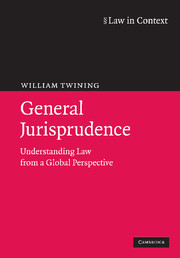Book contents
- Frontmatter
- Contents
- Preface
- Acknowledgements
- List of abbreviations
- Further abbreviations
- Part A
- 1 Jurisprudence, globalisation and the discipline of law: a new general jurisprudence
- 2 Analytical jurisprudence in a global context
- 3 Mapping law: Families, civilisations, cultures and traditions
- 4 Constructing conceptions of law: Beyond Hart, Tamanaha and Llewellyn
- 5 Normative jurisprudence, utilitarianism, and theories of justice
- 6 Human rights as moral, political and legal rights
- 7 Meeting the challenges to human rights: Griffin, Tasioulas and Sen
- 8 Empirical dimensions of law and justice
- Part B
- 14 Conclusion
- Bibliography
- Index
1 - Jurisprudence, globalisation and the discipline of law: a new general jurisprudence
Published online by Cambridge University Press: 05 June 2012
- Frontmatter
- Contents
- Preface
- Acknowledgements
- List of abbreviations
- Further abbreviations
- Part A
- 1 Jurisprudence, globalisation and the discipline of law: a new general jurisprudence
- 2 Analytical jurisprudence in a global context
- 3 Mapping law: Families, civilisations, cultures and traditions
- 4 Constructing conceptions of law: Beyond Hart, Tamanaha and Llewellyn
- 5 Normative jurisprudence, utilitarianism, and theories of justice
- 6 Human rights as moral, political and legal rights
- 7 Meeting the challenges to human rights: Griffin, Tasioulas and Sen
- 8 Empirical dimensions of law and justice
- Part B
- 14 Conclusion
- Bibliography
- Index
Summary
Clean water
A few years ago a team of local and foreign consultants was asked to evaluate the health of the criminal justice system (including police and prisons) in an African country that was starting to rebuild after a terrible period of human and natural disasters. Under the general rubric of promoting ‘democracy, human rights and good governance’, their remit was to devise a strategy and set priorities for expenditure by Government and a consortium of foreign donors. Part of this involved setting priorities for prisons. Seventy per cent of the prison population was on remand, often illegally. Despite the best efforts of the prison service, prison conditions were appalling. Money was short, and many of the problems seemed intractable, if not insoluble.
It was difficult to know where to begin. The country had a newly minted Constitution (including a Bill of Rights). Legitimated and validated by an admirably democratic constitutive process, this Constitution was a source of both national pride and strong, but not universal, public support. One member of the team suggested that the first principle should be: ‘Enforce the Constitution’. Brushing aside the argument that there were no sanctions against the Government for non-enforcement, the team adopted this as their starting point.
Article 24 stated: ‘No one shall be subjected to any form of torture, cruel, inhuman, or degrading treatment or punishment.’
- Type
- Chapter
- Information
- General JurisprudenceUnderstanding Law from a Global Perspective, pp. 3 - 31Publisher: Cambridge University PressPrint publication year: 2009
- 1
- Cited by



